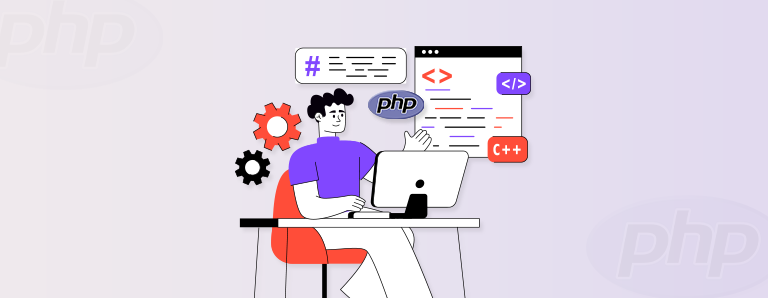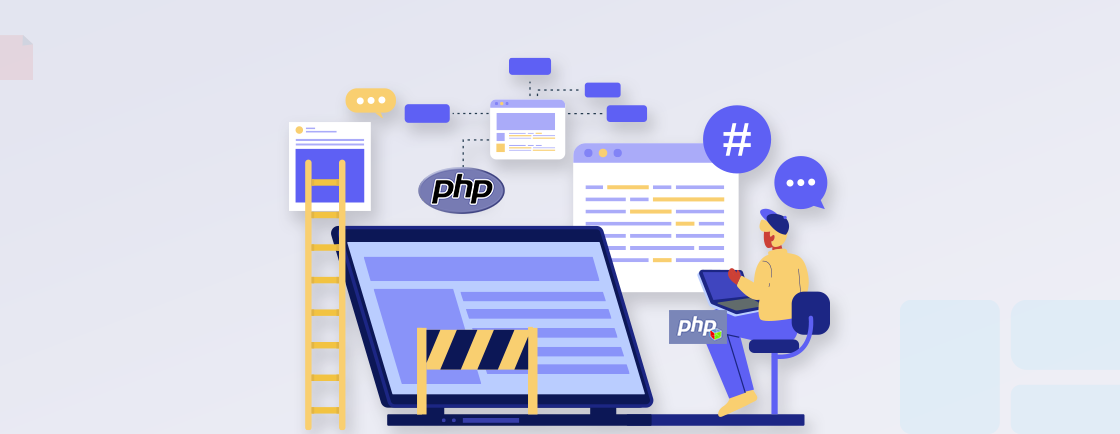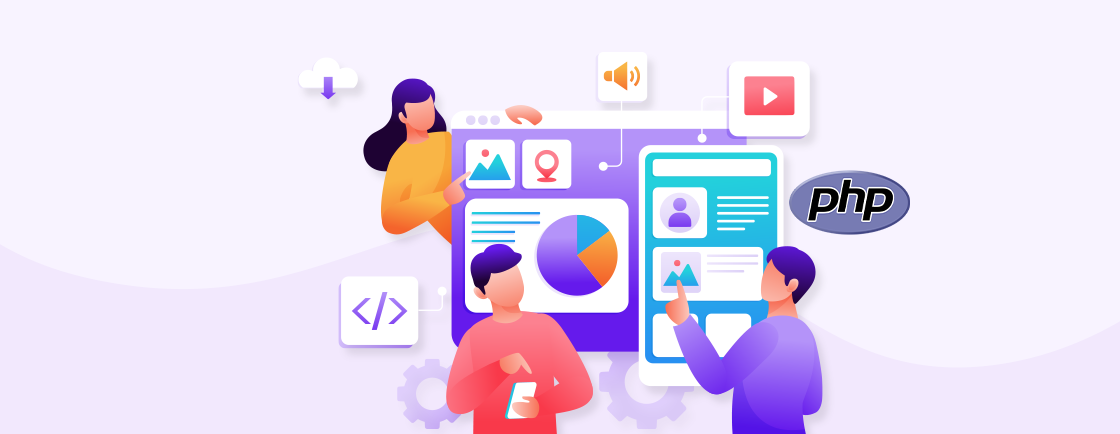Table of Contents
The Internet of Medical Things (IoMT) is revolutionizing healthcare. It connects devices and applications for real-time data insights. At its core lies PHP, a versatile language driving secure and efficient IoMT solutions.
Open-source and adaptable, PHP tackles diverse IoMT challenges. From wearables monitoring vitals to smart pillboxes boosting medication adherence. The vast ecosystem of PHP frameworks and powerful libraries offers a tech stack. It includes top choices such as Laravel and Symfony for delivering high performance.
The impact transcends development. Picture doctors equipped with real-time patient data, enabling proactive care. Telehealth platforms built with PHP connect patients remotely. Indeed, PHP and IoMT are a powerful combination. In this blog, we will look at how to use PHP for internet of medical things. So, let’s dive in!
What is the Internet of Medical Things (IoMT)?
The healthcare landscape is undergoing a seismic shift. Driven by the transformative power of the Internet of Medical Things (IoMT). This interconnected ecosystem of medical devices and applications sets the power of the internet. Further, this pack collects, transmits, and analyzes real-time health data.
- Sensor-Driven Data Acquisition. IoMT devices are equipped with diverse sensors. They capture a wide range of health parameters, including heart rate, blood pressure, and even brain activity. This continuous data stream provides a comprehensive picture of an individual’s health status.
- Wireless Connectivity. Data collected by IoMT devices gets securely transmitted. It could be via networks to cloud-based platforms or local servers.
- Data Processing and Analytics. Powerful AI and machine learning algorithms analyze a huge amount of collected data. It includes identifying patterns, trends, and potential health risks. This intelligence empowers healthcare professionals to provide personalized care.
- Real-Time Alerts. Based on the analyzed data, IoMT systems can trigger timely alerts to healthcare providers. This proactive approach can prevent complications and improve patient outcomes.
While IoMT presents immense potential, challenges remain. Data privacy and security are paramount. It requires robust safeguards to protect sensitive patient information. Additionally, interoperability between diverse devices and systems needs to be addressed. This benefits in ensuring seamless communication and data exchange.
Why Use PHP for the Internet of Medical Things (IoMT)?
The IoMT is revolutionizing healthcare with its interconnected network of devices and applications. But what language bridges the gap between data and insights? Look no further than PHP, a versatile and powerful tool ideally suited for building secure and efficient IoMT solutions.
- Open-source. Unlike other options, PHP’s open-source nature eliminates licensing fees. This makes it an attractive choice for budget-conscious healthcare projects.
- Framework and Library Ecosystem. PHP boasts a vast array of frameworks and libraries tailored for specific IoMT needs.
- Rapid Development. PHP’s syntax is relatively easy to learn. This allows you to quickly prototype and conduct IoMT solutions as per healthcare needs.
- Active Community. With a global community of developers, PHP offers readily available support and expertise.
- Scalability. PHP security measures makes it easy to handle large-scale IoMT deployments. That too while safeguarding sensitive patient data.
PHP is an ideal choice for building secure, scalable, and efficient IoMT solutions, offering rapid development, a rich library ecosystem, and strong community support. Its open-source nature also makes it cost-effective for healthcare projects. Partner with a trusted PHP development company to build robust IoMT applications that ensure security, scalability, and seamless performance.
Best PHP Frameworks for Internet of Medical Things (IoMT)
The diverse IoMT demands tailored solutions, and some of the top PHP frameworks step up to the challenge. But with many options available, selecting the right one can be daunting. This guide sheds light on the best of them, helping you to pick one as per your needs.
1. Laravel
When navigating the world of PHP frameworks for IoMT, Laravel emerges as a powerful contender. It is renowned for its flexibility and feature-rich ecosystem. Thus, benefits from building secure solutions that connect the dots in healthcare.
- Development. Laravel’s eloquent techniques and expressive features accelerate development, saving time and resources. This agility is crucial in the fast-paced world of IoMT, where rapid prototyping is essential.
- Security. Built-in security features like Laravel authentication, authorization, and encryption safeguard sensitive patient data. Laravel prioritizes data privacy, giving you peace of mind.
- Architecture. From small-scale patient monitoring systems to large-scale telehealth platforms. Laravel’s modular design scales seamlessly to accommodate growth and evolving needs.
Laravel is a flexible, feature-rich PHP framework that accelerates development while ensuring robust security for sensitive healthcare data. Its scalable architecture supports everything from small patient monitoring systems to large telehealth platforms.
2. Symfony
Aiming for a large-scale and mission-critical IoMT application? Symfony stands out as a champion of stability and power. Its component-based architecture fosters maintainable solutions. This makes it ideal for complex projects like management platforms or medical data analytics systems.
- Component-Based Architecture. With Symfony, you can build customized solutions by assembling individual components.
- Performance. Symfony handles large-scale deployments effortlessly. Using it can benefit in scaling seamlessly to accommodate growing user bases and data volumes.
- Long-Term Maintainability. The modular architecture encourages clean code practices and facilitates future updates. This contributes to the long-term viability of your IoMT solution.
Remember, regardless of the tech stack you choose, your expertise with PHP and its frameworks matters the most. You’ll need to familiarize yourself with IoMT intricacies. Some of the common ones include data privacy regulations and device integration.
3. Phalcon
When real-time data processing and lightning-fast performance are paramount in your IoMT vision. Under such consequences, Phalcon emerges as a worthy contender. Its C-extension-based design delivers exceptional speed. Medical device data streaming or patient monitoring dashboards get easier with the PHP framework.
- Performance. Phalcon boasts blazing-fast execution speeds, outperforming most other PHP frameworks. This makes it ideal for IoMT applications. Especially where real-time data processing and responsiveness are critical.
- Minimal Footprint. Its lightweight design translates to lower resource consumption. With this, Phalcon makes itself suitable for deployment in resource-constrained environments. Potentially relevant for edge computing in IoMT scenarios.
- Security Features. Phalcon offers built-in security mechanisms like authentication and authorization. This safeguards sensitive healthcare data and adheres to industry standards.
With Phalcon’s exceptional speed and collaboration, you can build high-performance IoMT solutions. This releases real-time insights and revolutionizes healthcare delivery.
Best PHP Libraries for Internet of Medical Things (IoMT)
While frameworks lay the foundation, the top PHP libraries supercharge your IoMT applications. It added specialized functionalities. Here, we’ll be understanding the benefits while highlighting the top contenders. This will help you to make informed choices.
1. PHP-MQTT
Within the IoMT, real-time data exchange between devices and applications is paramount. Enter PHP-MQTT, a powerful library that seamlessly implements the MQTT protocol. This enables efficient and reliable communication within your IoMT solution.
- Real-time Data Exchange. MQTT is specifically designed for low-bandwidth, resource-constrained environments. Using it you can connect diverse medical devices in IoMT scenarios.
- Scalability and Performance. PHP-MQTT handles large numbers of connections efficiently. This lets your IoMT solution scale effortlessly as your device network grows.
- Open-source and Secure. As an open-source project, PHP-MQTT fosters transparency and allows for security auditing. It contributes to the overall security of your IoMT solution.
The IoMT hinges on efficient, real-time communication between devices and applications. PHP-MQTT emerges as a valuable tool in this landscape. It offers its MQTT protocol implementation to power data exchange within your IoMT solution.
2. Workerman
The IoMT demands efficient handling of real-time data streams and concurrent connections. There’s where Workerman walks in. It is a PHP library designed for high-performance asynchronous tasks. This makes it a perfect tool for tackling these challenges within your IoMT application.
- Real-time Data Processing. Workerman excels at handling continuous data streams from medical devices. It enables real-time analysis and insights for improved patient care.
- Asynchronous Task Management. Complex calculations and data processing can be handled efficiently in the background. While also assuring unaffected application responsiveness, crucial for smooth IoMT operations.
- High Support. Workerman seamlessly manages numerous concurrent connections. This lets your IoMT solution scale effectively as the number of connected devices grows.
Using PHP Workerman and the IoMT, you can build high-performance, scalable, and secure solutions. It can efficiently handle complex tasks. Also benefits in unlocking real-time insights, and contributes to improved healthcare outcomes.
3. ReactPHP
Real-time data processing and handling high volumes of connections. The two most important processes within the IoMT. Consider ReactPHP. It is a PHP library that lets you build event-driven, scalable applications that can tackle these challenges in your IoMT solution.
- Real-time Processing. ReactPHP excels at handling large numbers of concurrent connections and events. This enables efficient real-time processing of data streams from medical devices. Leading to faster insights and improved patient care.
- Scalability. Its event-driven architecture scales with your IoMT network’s growth. With these in-built functionalities, ReactPHP ensures smooth operation. No matter even if the IoMT application is connected to thousands of devices.
- Resource-Friendly. ReactPHP minimizes resource consumption compared to traditional PHP applications. This makes it suitable for deployment in resource-constrained environments. Also, for relevant edge computing in IoMT scenarios.
As the IoMT evolves, choosing the right tools becomes crucial. Indeed, ReactPHP shines in real-time data processing and handling high connections. But, you’ll also need to explore available resources. engage with the ReactPHP community, and prioritize best practices to ensure a secure and efficient IoMT solution.
How PHP and the Internet of Medical Things (IoMT) Can Be Used?
The Internet of Medical Things (IoMT) is rapidly transforming healthcare. It connects devices, patients, and healthcare in a seamless network of data exchange. At the core of this revolution lies PHP’s versatility and flexibility. Let’s dive into how PHP and IoMT can work together to unlock new possibilities for improved patient care and healthcare delivery.
1. Remote Patient Monitoring
You can use PHP and IoMT for wearables, biosensors, and implanted devices. Using it you can capture vital signs, chronic condition data, and post-surgical recovery progress in real time. These practices can proactively intervene. Thus, reducing hospital readmissions and supporting patient self-management with actionable insights.
2. Medication Compliance Management
Medication management can be seamless. By combating missed or misused medications through automated reminders. You can adopt smart pill dispensers integrated with prescribed schedules. Also, can adhere to real-time data for healthcare providers. Ultimately, improving treatment effectiveness and ensuring patient safety through data-driven interventions and adjustments.
3. Telehealth Platforms
Bridge geographical barriers and expand access to quality healthcare. By using secure and user-friendly virtual consultations. With the integration of PHP and IoMT, you can enable remote follow-up appointments. This can be used for chronic condition management, mental health consultations, and physical therapy sessions. Thus, optimizes healthcare resources and patient convenience.
4. Medical Device Management
Streamline hospital and clinic operations with centralized dashboards for monitoring device status and maintenance needs in real-time. This can reduce downtime and improve efficiency through remote configuration triggered by data analysis. Ensure device security and patient safety with robust access control to industry regulations within the management platform.
5. Data Aggregation and Analysis
Unlock the power of IoMT data with PHP-powered processing, generating actionable clinical insights for personalized treatment plans. Identify emerging trends and patterns to predict disease outbreaks and optimize resource allocation. With these practices, you can fuel research and development of innovative healthcare technologies.
The incorporation between PHP and IoMT presents future-focused possibilities for improved healthcare. From remote patient monitoring to data-driven insights, these applications showcase the transformative potential of this dynamic duo. But remember, this is just the beginning.
Challenges and Considers in PHP and Internet of Medical Things (IoMT)
While PHP offers significant potential for IoMT development, it’s crucial to navigate potential challenges and carefully consider various aspects before undertaking your project.
1. Data Privacy
Data privacy is paramount in IoMT, especially when using PHP due to its inherent accessibility and potential vulnerabilities. Understanding and navigating these challenges is crucial for ensuring responsible development and patient trust.
PHP and IoMT Data Privacy Challenges:
- Data Minimization. Collect only the least data necessary for specific functionalities, avoiding unnecessary data gathering. Clearly define and communicate the purpose of data collection. This will enable you to get informed consent from patients.
- Third-Party Integrations. Many IoMT solutions rely on third-party libraries or services. Carefully vetting these providers, and ensuring contractual safeguards are in place are vital.
- Device Vulnerabilities. Medical devices can be susceptible to security breaches. Utilizing secure communication protocols and addressing device-specific vulnerabilities is crucial.
PHP and IoMT Data Privacy Considerations:
- Data Minimization. Collect only the minimum data necessary for specific functionalities, avoiding unnecessary data gathering. Clearly define and communicate the purpose of data collection, and obtaining informed consent from patients.
- Compliance. Thoroughly understand and adhere to relevant data privacy regulations. It must include HIPAA, GDPR, and local compliance requirements. Conduct regular data protection impact assessments (DPIAs) to identify and mitigate privacy risks.
- User Control. Provide clear and accessible information about data collection, storage, usage, and sharing practices. Empower patients with control over their data. Allowing them to access, correct, or delete personal information as needed.
By considering these points, you can build PHP-based IoMT solutions that prioritize data privacy. Remember, it is not just a technical challenge but an ethical imperative.
2. Device Compatibility
The diverse landscape of medical devices adds a layer of complexity to IoMT development with PHP. Ensuring seamless communication and data exchange requires careful consideration of device compatibility challenges.
PHP and IoMT Device Compatibility Challenges:
- Heterogeneous Devices. Medical devices utilize various communication protocols. It can include data formats, and APIs, creating compatibility hurdles.
- Limited Standardization. A lack of universal standards across manufacturers can complicate integration. Thus can lead to vendor lock-in.
- Legacy Devices. Integrating older devices with outdated protocols into modern IoMT solutions can be challenging.
PHP and IoMT Device Compatibility Considerations:
- Understanding the Landscape. Identify the types of devices you intend to integrate. It must include communication protocols and data formats. Research existing interoperability solutions like open-source libraries and standardized APIs.
- Adaptability. Leverage open-source libraries and frameworks that support widely adopted standards like HL7 FHIR. Avoid vendor lock-in by choosing solutions that promote compatibility with various devices.
- Collaboration. Engage with device manufacturers and experts to address compatibility challenges. Participate in open-source communities for IoMT and healthcare data exchange. Contribute and benefit from collective knowledge.
Using such considerations you can build PHP-based IoMT solutions that integrate with diverse medical devices. Prioritizing open standards, adaptable design, and active collaboration paves the way for a more connected and interoperable IoMT ecosystem.
3. Regulatory Compliance
The promise of IoMT, powered by PHP, hinges on navigating a complex regulatory landscape. Addressing compliance challenges is crucial for developing secure, ethical, and legally sound solutions.
PHP and IoMT Regulatory Compliance Challenges:
- Data Privacy. Stringent regulations like HIPAA and GDPR govern patient data collection, storage, and usage. Implementing security measures and transparent data practices is paramount.
- Standards. Ensuring your IoMT solution aligns with data exchange standards. This fosters compatibility and avoids regulatory roadblocks.
- Clinical Validation. Demonstrating safety through relevant studies may be required for certain IoMT applications.
PHP and IoMT Regulatory Compliance Considerations:
- Regulatory Assessment. Identify relevant regulations based on your device types and data usage.
- Compliance Management System. Establish processes for documentation, audit trails, and risk mitigation strategies.
- Data Privacy. Employ robust encryption, access control, and transparent data governance practices.
With compliance strategy, building innovative and responsible IoMT solutions with PHP gets easy. Compliance is an opportunity to build trust and contribute to a more ethical healthcare ecosystem.
Conclusion
PHP proves to be an ideal language for the Internet of Medical Things (IoMT), enabling secure, scalable, and efficient healthcare solutions. Its versatility, open-source ecosystem, and strong community support allow developers to build applications that handle real-time data, connect diverse medical devices, and deliver actionable insights for improved patient care.
By combining PHP with specialized libraries such as PHP-MQTT, Workerman, and ReactPHP, IoMT applications can manage high-volume data streams, ensure real-time processing, and maintain robust security standards. These tools empower healthcare providers with remote patient monitoring, medication management, telehealth services, and centralized medical device management.
To turn your IoMT ideas into reality, hire dedicated PHP developers who can accelerate your project, optimize performance, and ensure the highest standards of security and compliance.
FAQs About PHP and Internet of Medical Things (IoMT)
Can PHP be used for real-time monitoring in healthcare applications?
Absolutely! PHP excels at handling high volumes of concurrent connections and processing data streams in real time. This makes it suitable for tasks. You can count on monitoring vital signs from wearables and tracking medical device status.
Can PHP handle healthcare standards like HL7 in IoMT applications?
While PHP itself doesn’t natively support standards like HL7 FHIR. Its open-source libraries and frameworks bridge the gap. This helps in integrating and ensuring the IoMT application adheres to industry standards.
How does PHP contribute to patient data privacy in IoMT applications?
Security and privacy are paramount in healthcare. While PHP is inherently flexible, responsible development practices are crucial. Consider implementing access control measures, and data privacy regulations like HIPAA and GDPR. With this PHP applications can safeguard sensitive patient information.
Master PHP Web Development
Access expert guides and tips to enhance your PHP programming capabilities.





